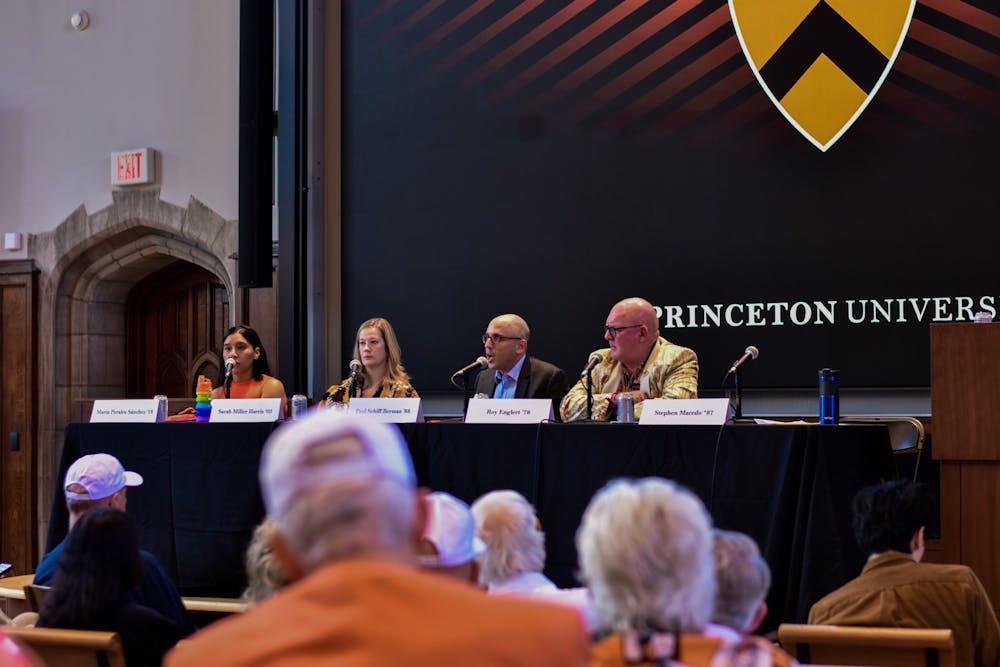On May 26, over a hundred alumni piled into McCosh 50, nearly filling the largest lecture hall on campus, to listen to a panel of alumni lawyers, activists and law professors discuss the Supreme Court entitled “Constitutional Controversies: The Supreme Court’s Impact on American Society.” Panelists agreed that affirmative action would be struck down, but expressed the view that it would not significantly change college admissions.
The event was moderated by politics and Center for Human Values professor Stephen Macedo ’87 and featured panelists Roy Englert ’78, a partner at Kramer Levin Naftalis & Frankel; Paul Schiff Berman ’88, a professor at George Washington University Law School; Sarah Miller Harris ’03, a partner at Williams & Connolly LLP; and María Perales Sánchez ’18, an Immigrants’ Rights Activist.
Notably, Perales Sánchez was named on a 2019 complaint filed by the University and Microsoft to the Supreme Court regarding the Trump administration’s termination of the Deferred Action for Childhood Arrivals (DACA) program. The Court eventually restored the program.
On the panel, Harris represented the right, Englert the centrist left, and Berman and Sánchez the left. Macedo jabbed at critics of the free speech climate on campus in his introduction saying, “I look forward to a lively and civil exchange of views, which is very common here at Princeton, despite some reports.”
Frustration with the Court, where only three of the nine current justices were appointed by Democrats, was palpable in the room. Audience applause was louder and more common after statements more critical of the Court.
In addressing the legitimacy of the Court, Harris, who clerked for Justice Clarence Thomas, defended the institution.
“If you think that the Court’s job is to freelance and intervene to promote abstract values such as liberty or democracy, you’re going to be disappointed in the Court,” she said. “What it does, under Article Three of the Constitution, is decide cases and controversies…which is why Alexander Hamilton called it the least dangerous branch of government.”
Berman, on the other hand, was critical of the Court’s power.
“One of the concerns about the current Court is not only that it's so far off of popular consensus, but regardless of your politics, it seems to me that this Court is aggregating way too much power to itself to decide more than it needs to decide.” Giving an example, he said, “So Dobbs itself could have upheld the particular statute [the abortion-restricting law] that was before [the Court] without going so far as to overturn [Roe vs Wade].”
Affirmative action, of major relevance to the University, was raised in an audience question, referencing the impending decision in Students for Fair Admission, Inc. vs. President and Fellows of Harvard College and Students for Fair Admissions, Inc. v. University of North Carolina. The questioner asked the panelists to share their “expectations for affirmative action and hypothesize [about] the implications on places like Princeton.”
While all panelists who responded expect the Supreme Court to rule that considering race as a factor in admissions is illegal, they offered different assessments as to the merits of that decision.
Englert argued that Harvard had a quota system, which has already been ruled unconstitutional by the Supreme Court in 1978 University of California v. Bakke ruling, so using race as one factor out of many may not be struck down.

Harris, who said she supports getting rid of affirmative action, said she expects the effects of the Court’s impending decision to be muted because schools will “find different ways of achieving similar goals.”
Berman speculated that the recent trend of schools like Princeton becoming test-optional will make it more difficult to tell if schools are using affirmative action, which suggests that some elements of affirmative action may persist.
Audience members loudly applauded a question asked about whether the Court lacks a code of ethics.
Questions surrounding the court’s code of ethics have been relevant since it was revealed that Justice Clarence Thomas received large gifts, including his child’s private school tuition, from billionaire, conservative legal activist, Harlan Crow.
Harris, the panel’s conservative voice, largely dismissed the concern, pointing out that the justices are “people as well,” in addition to saying that she finds it “curious that people were not criticizing other justices at earlier points in time for international trips.”
Berman again disagreed, contrasting Justice Ruth Bader Ginsberg’s behavior with Justice Thomas’s. Berman pointed out that Justice Ginsberg, for whom he clerked, went to great lengths to avoid any appearance of impropriety, donating any speaker fees she received.
Ending the panel on a unifying note, Englert shared a story in which he was talking to Chief Justice John Roberts about his high-school aged kids at colleges. According to Englert, when Roberts said that they were looking at Harvard, he said, to the loud laughter of the audience, “Harvard? They don’t want to look at a good school?”
Julian Hartman-Sigall is an assistant News editor at the ‘Prince.’
Please send any corrections to corrections[at]dailyprincetonian.com.








